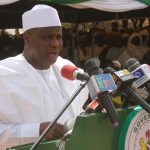UN Body Seeks Access To Quality Learning For All Children In Afghanistan
Asia, Latest Headlines Tuesday, November 9th, 2021
(AFRICAN EXAMINER) – Amid mounting humanitarian crisis in Afghanistan, Education Cannot Wait (ECW), the United Nations global fund for education in emergencies and protracted crises, has harped on the need for all the children to have access to quality education.
The ECW said school should be reopened for all the children, particularly girls, adding they must be able to return to secondary school classrooms, just as primary schools have opened for girls’ education.
Director of ECW, Yasmine Sherif made the observation after leading a landmark, first-ever all-women mission to Afghanistan last week.
Sherif visited a girls’ school in Kabul and spoke to students, female teachers and administrators as part of her Afghan mission. She also met with the de facto education authorities at the Ministry of Education to advocate the right of all children to quality education.
The ECW mission comes less than a month after ECW launched a US$4 million First Emergency Response grant to provide ‘quality, flexible learning and psychosocial support’ for children and adolescents caught in the escalating crisis.
She is cautiously optimistic following her meeting with the de facto education authorities, to whom she appealed for a return to secondary school for girls.
“Primary schools have opened for girls’ education and for girls’ secondary education, the de facto authorities told us that they are developing a plan. I stressed that the girls have no time to lose, and that the benefits of educating girls is crucial to the future of the country.
“We need to act fast. When you are in the midst of a humanitarian emergency like Afghanistan, where there is no money in circulation, starvation is very real fact and poverty is extreme.
“Schools need to continue to reopen and education must be sustained. Not only at primary school levels, but through secondary schools – and girls have to go back to secondary schools. Afghanistan cannot wait. The girls of Afghanistan cannot wait. Education cannot wait,” she said.
The ECW director noted that there are more women on the streets of Kabul today, adding that she even saw women demonstrating for health care and that she also visited a girls’ primary school whose teachers and administration were all women.
“The school’s headmaster is a woman, the school’s doctor is a woman, administrators and teachers are women. There are educated, strong women who are working, but they do not get salaries, because there are no salaries for basic services as a result of the funding freeze to Afghanistan,” she added.
Sherif commended international and national civil society organizations that now work with religious scholars as they negotiate the resumption of secondary school education at the grassroot level.
“By bringing an Islamic scholar with them, these NGOs have actually managed to build trust. So secondary schools have opened in some provinces, a few in the north and a few in the south. It is important to stand firm on human rights and girls rights, but you must also have the ability to build trust as well,” she stressed.
She said ECW is already prepared to swiftly scale up its support and adapt its programming in Afghanistan, adding that new challenges and more children in need of help demand pivoting and quick response and that the ECW was created for crises like these.
“As the UN’s global fund for education in emergencies and protracted crises, we are agile, quick and flexible. We use decades of lessons learned across the UN system to respond to crises. Traditional development aid modalities that are not crisis-sensitive are not going to work; not in this situation,” she further explained.
She observed that an estimated $1 billion is urgently required for UN agencies and international and local NGOs to meet the pressing education needs across the country.
According to her, funding can be channeled through the UN agencies like the World Food Programme and UNHCR, the UN Refugees agency directly to implement aid programmes. She added that “nothing needs to, nor will go through, the de facto authorities.”
“It’s about how can we save the Afghan population from a humanitarian catastrophe. How can we ensure that every Afghan girl and boy in the country can go to primary and secondary school? It’s about how we can ensure that teachers receive their salaries, so they are able to continue to teach.
“It is about providing teaching and learning materials and safe learning environments. It is about ensuring that the rights of adolescent girls to access education is fulfilled. That is why it was important for us to do an all-women mission to Afghanistan and to make clear where we stand on girls’ education,” she added.
Sherif is hoping that the visit can give the world an open window view into life in Afghanistan and provide concrete recommendations for international aid to be immediately scaled up and invested to support quality education for both girls and boys.
Related Posts
Short URL: https://www.africanexaminer.com/?p=70403























